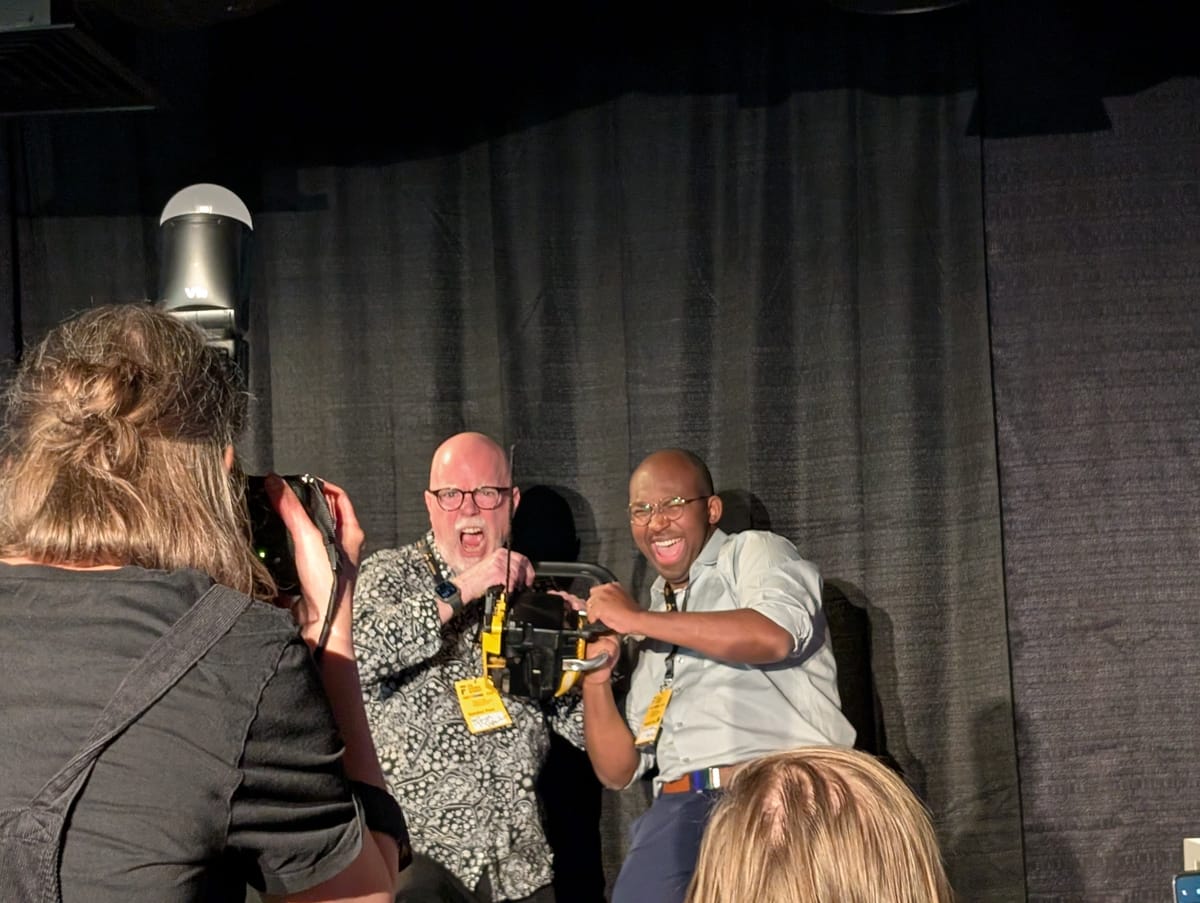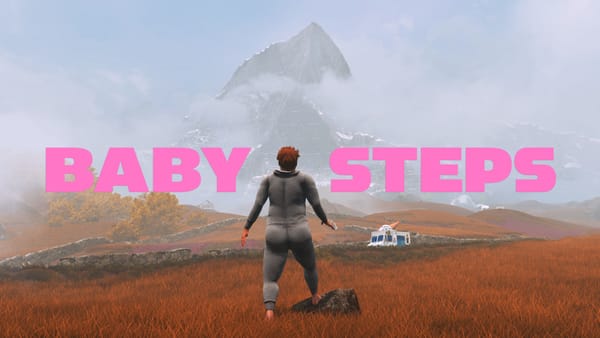Memory Card #5 : A.I-aye Captain

Where Do You Draw The A.I Line?
Over the last few years, Large Language Models and generative AI tools have been pushed more and more in the tech space as the next big thing. Why pay someone to code your game or create art assets when you can just ask a computer? After an endless parade of layoffs from large companies to cut costs in favour of using AI to churn out more content, people have been looking more and more to smaller studios like Sandfall Interactive (Clair Obscur : Expedition 33) for games they can believe in. However being “indie” is by no means a byword for reliability.
The Alters is a sci-fi cross between survival and crew management recently released for PS5, Xbox and PC by 11 Bit Studios (Frostpunk). In it you play as crash survivor Jan Dolski (played by Alex Jordan) who is forced to run a crew made entirely out of his clones, given memories from alternate timelines, in order to escape the planet he’s stranded on. Although some felt the game was too punishing in its difficulty in contrast to the humour inherent in the premise, the game was fairly well-received.
That is until the 23rd of June. As reported by Eurogamer, some social media users pointed out that various background text in the game appeared to be the product of LLMs, with the telltale response to a prompt “Sure, here’s a revised version focusing purely on scientific and astronomical data:”. In addition the Brazilian Portuguese translation was found to contain the same chipper prompt response in its subtitles, helpfully translated back by Steven Flow on Bluesky as “Every conversation two people can have, right? So we-”. Clearly, the text was copied wholesale from Chat-GPT and put right back into the game without proofreading.
A week later, 11 Bit put out a statement confirming that AI assets were used in development of the game as placeholders and were “never intended to be part of the final release”. The statement also covered the subtitles, saying that AI was used to cover the licensed films included in scenes “due to extreme time constraints” and that their localisation teams would now be involved in a hotfix. Although the statement is apologetic for this it is keen to downplay it as much as possible, asserting that it was “just 0.3% of the overall text”.
Although PC platform Steam has an AI disclosure requirement for games published on it, there is no such mention of this in the game’s description. Considering the “extreme” time crunch the studio put their game on, it is easy to believe that this rush led to things like the background text being overlooked by Quality Assurance playtesters. In my view, this was not something they wished to conceal but its presence is overall damning.
As AI has grown in prominence, there is a fractured trust between developers and players regarding secretive use of the tools during development. For instance, Clair Obscur was found to have AI-generated “art” of posters on a pillar in the game, despite the creative director asserting that “no AI whatsoever was used in the game”. This was spotted months ago and brushed off by many with more faith in Steam’s AI requirements than I. However, they were later patched out of the game, proving they were placeholders either shipped with the intent of being replaced or removed just now to keep the heat away from them. Nonetheless, the game has not disclosed AI usage on its Steam page at any point.
The power costs and ramifications of AI usage are widely-known and little care about at this point, but beyond the tangible environmental impact of using these tools are the smaller ways outsourcing placeholders to an algorithm can hamper games. First of all, lower-stakes writing like background text or lore codexes can be an entry point or training tool for writers new to games that allows them to work within a team without having to spearhead anything out of the door. Removing this step from the ladder with AI is an easy way to cut down on the talent coming into the industry. If the text doesn’t matter to the point that the graphical designer’s placeholder doesn’t get removed, then why not either hand it to an intern or fill it with lorem ipsum?
Second, generating exactly what you think you want as a placeholder instead of whipping up some programmer art can restrict what the game can become. I always think about how Xalavier Nelson Jr. of Strange Scaffold was working on a game about space when he put a royalty free JPEG of a dog into the build and was so tickled by seeing it tower over him when playing that the whole game pivoted to be An Airport For Aliens Now Operated By Dogs. Instead of an artist throwing something together for the posters on the pillar that could lead to a cheeky easter egg, Sandfall generated some posters that were so unremarkable that QA overlooked them. The upcoming Everybody’s Golf : Hot Shots (HYDE Inc) is using AI generated assets for its leaves and grass. To its credit this one is actually disclosed on Steam, but there’s no need to do this in the first place. Get junior members to make them, re-use assets from older entries or even pay a tiny fee to licence some pre-made assets if you need them so quickly. Although I will always sympathise with the struggles of game development, taking the easy route in any artistic field is only going to limit the potential of the artist and work.

In a recent (region-locked) interview, producer Masahiro Sakurai (Kirby Air Ride, Meteos) expressed concerns about the expectations and rate of high-end game development, fearing that generative AI may become the only way to keep up with the demands. This was misconstrued by some as an endorsement of the theft-based tools thanks to poor AI translations (the irony is not lost on me) but was in fact an honest assessment of the games industry right now. Our old friend Daniel Vávra told The Game Business how he wants to use AI to realise more of his ideas on the scale of Kingdom Come : Deliverance too. This very week, BDS target Microsoft laid off 9000 people to cut costs after a period of untempered growth, with games years into development scrapped. Companies need to sell games right now and they don’t care so much about the quality or fostering talent as they do about pleasing their investors.
Every time AI usage comes up, there are always people willing to overlook it so long as they like the final product. I’ve talked about my own conflict over Level 5 before (whose CEO recently made some back-pedalling statements I can’t quite swallow). It’s only background text, people say. It’s only a couple of designs. It’s only one translation. It’s only the whole game. Not everyone is a hapless, overpaid executive outsourcing their thinking to a machine, granted, but it’s a slippery slope nonetheless and we’re all poorer for it. I was glad to see places like Aftermath recant their reviews when the news broke. Don’t be a boiling frog, jump out of the saucepan.
So what’s the future for The Alters? The Deluxe Edition of the game promised DLC, so they likely want to cover this pothole up as much as possible while the team develops that. Even if every instance of AI placeholders are patched out of the game, nothing short of cutting AI tools from their creative processes will smooth things over for many. In a world where QA didn’t pick up on this ahead of release, one has to wonder how many games out there right now have AI “art” in them, which inevitably leads to witch-hunts where innocent games also get hit. Without actual enforcement over their AI disclosure on Steam, this story will just play out again and again as the industry at large pushes itself further than it should.
The Alters is a sci-fi management game developed and published by 11 Bit Studios for PC via Steam, PS5 and the Xbox Series consoles for $35/£30. All screenshots and assets used in this article are copyright of 11 Bit Studios and Sandfall Interactive, unless they were also AI-generated.
R.I.P & Tear
N.B : This article was written before the 7th of July, but an updated paragraph and statement from Romero Games has been added to the end of it. In short, they're still open, if not flush with cash.
It’s no secret that Microsoft’s games division is poorly managed. Early success with hands-off approaches and acquiring existing studios instead of spinning up new ones has snowballed into an unsustainable and unmanageable mess of studios with a $69 billion expense to justify to investors. So what do Phil Spencer, Sarah Bond, Matt Booty and all of the other higher ups with more money than sense do? They close entire studios, lay off literally thousands of people and cut off the lifelines for outside studios they had been working with. The one that’s hit hardest for me has been Romero Games.
Founded by Brenda and John Romero in 2015, Romero Games is, sorry, was a game development studio based in Galway, Ireland. During its time the studio developed Empire of Sin (published by Paradox Interactive) among smaller games and were working on and actively hiring for several titles, including a first-person shooter. The company also served as a publisher for Romero’s Doom mod packs Sigil and Sigil II.
I wrote before about visiting Ireland for the FÍS Games Summit, which Romero Games was no small part of. I met at least five people proudly clad in team jackets and the company was a major sponsor for the show. Senior member Tom Hall gave the last talk of the day where he whipped out the iconic Doom chainsaw at the end to much delight. I interviewed Romero’s daughter and community manager Maezza, who was patient and gracious with her time. Things felt positive at FÍS, a rare bit of optimism in 2025 bolstered by Romero Games becoming the backbone of local game development.
And now it’s all gone.
On the 2nd of July, Microsoft went ahead with its cost-cutting measures and the next day Brenda Romero put out a statement. “Our publisher,” it read, naming no names, “has cancelled funding for our game”. Rare in these statements is her assertion that “this absolutely isn’t a reflection of our team’s work, performance or the quality of the project itself”. If the past few years of layoffs have told us anything, it’s that the game industry is far from a meritocracy. Wrapping up, Romero mentions how much of the team has “worked together for more than a decade, some for over 20 years” and encourages anyone with opportunities to reach out to them or the team.
In the hours that followed several members of the team took to social media to announce their layoffs from the studio as reported on by IGN, VGC, and others. It is estimated that close to 100 jobs were lost as a result of Microsoft’s cuts, the whole studio shutting down if posts from Leslie Stowe and Eric Wong are to be believed. Although most affected have not explicitly mentioned Xbox or Microsoft as the publisher responsible, former Hard Surface Artist Christoph Redl did name them in their post.
It’s tempting to lionise the memory of Romero Games as I eulogise them here, but I want to at least acknowledge how enthusiastic every employee I encountered was about working there. I imagine that the pretty generous benefits like four weeks of time off per year and a strong dedication to diversity helped with that. Take the corporate bumf with a pinch of salt of course, but it’s undeniable that everyone was proud to work there from all levels of game development.
Back in my FÍS travelogue, I promised to write up the things I’d cut for pacing like Tom Hall’s talk and my interview with Maezza Romero. I’ve…been pretty busy and I’ll admit that writing up several hour-long presentations to then pick quotes from to write around, maybe reaching out to those I’d spoken to for further clarification, was all a bit daunting alongside deadlines and moving. However, I feel a responsibility to at least write these up now, as artifacts from a point in time already passed. Probably not going to be able to get the slides from Tom Hall, but hey I’ll try.
For now, as I type this article using Windows 11, I can’t help but feel disgusted with Microsoft in all new ways and more complicit than I’d like to be. If the company’s involvement with the genocide in Gaza, their commitment to wasteful and intrusive AI or their paltry showing as far as games up to this year hasn’t convinced you to divest yourself of at least their Xbox arm, maybe this will.
UPDATE : Hours before this article was set to publish, Romero Games put out another statement.

As suspected, confidentiality agreements have meant that the studio is unable to name Microsoft as the publisher who has cut funding, but the studio is not closed, even if they need to rethink their staffing. Additionally, it seems that their original publisher did not retain the rights to the game as Romero Games is looking to "bring the game across the finish line" with a new partner. I have decided to leave the rest of my article as I wrote it last week (that's what I get for scheduling these things so far in advance) as the studio's future is still uncertain.
Now Loading…
Thanks for reading! Thought I’d get back into the swing of this with some light-hearted topics. Since we last spoke, I interviewed for an internship with Endless Mode, Paste Magazine’s new games website. I didn’t get it sadly but the 500-ish word article per day and 1500-ish article once per week that I would have been doing has inspired me to make a little change here. I probably won’t be putting out quite that many, but I hope to do a few smaller pieces alongside deeper essays.
I don’t want to flood anyone’s inbox, so here’s the plan : I’ll upload them to the site without an email notification (and one day early on Patreon, please give me money) and then compile them as a newsletter each week like I have otherwise. This should also let me better link to specific pieces I’ve done when applying and pitching elsewhere. No hard promises on how much I’ll write each week, nor how reliably I’ll actually do this, but I think it’ll be a good exercise to do some writing that doesn’t take two weeks of careful research sometimes. Also I’m not going to do the week ahead release calendar anymore as Game Informer’s is back up and that was taking way too much time to curate. Hope to write some reviews of what I’ve been playing though.
📚 Reading : I’ve completely fallen off of reading but I’m still part-way through Daisy Jones & The Six by Taylor Jenkins Reid.
📺 Watching : Thanks to the power of password sharing, I’ve been enjoying Game Changer on Dropout while I eat dinner, currently on the Battle Royale episodes from Season 5.
🎵 Listening : Mostly been indulging in familiar songs lately, but the last album I listened to was Record Collection by Mark Ronson and co. I need to listen to more from Q-Tip
🎮 Playing : Finally stopped putting off Deltarune Chapter 4 by Toby Fox and co. It’s good! Also doing runs in Mushroom Musume, Mario Kart World and Spelunky from time to time.
If you liked this newsletter or anything from Memory Card, consider supporting me on Patreon or with a one-time donation on Ko-Fi. You can follow me on BlueSky if you want to, and of course make sure to sign up for this newsletter if sent it by a friend or foe. See you next week!


